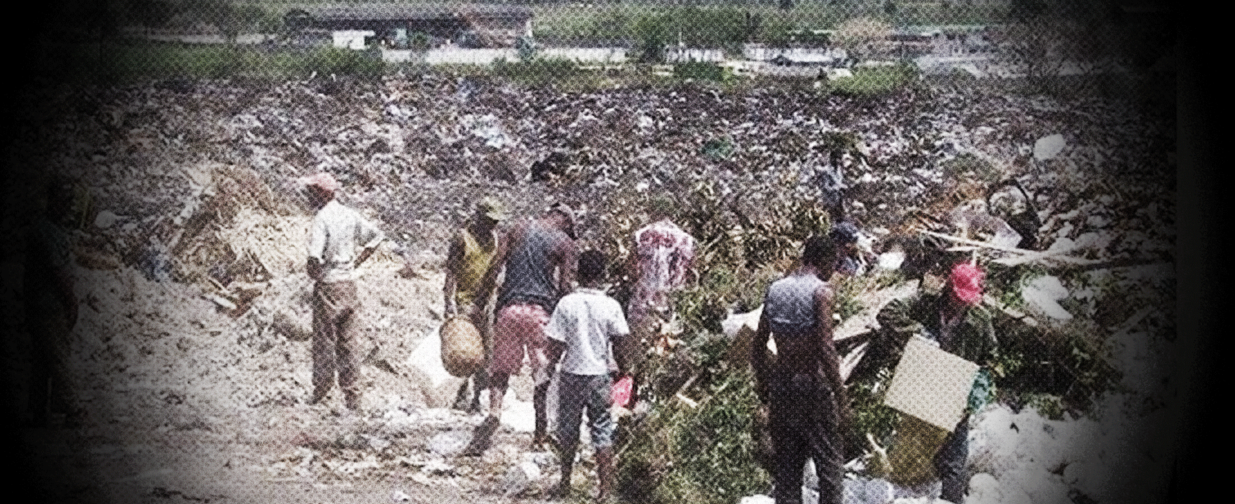
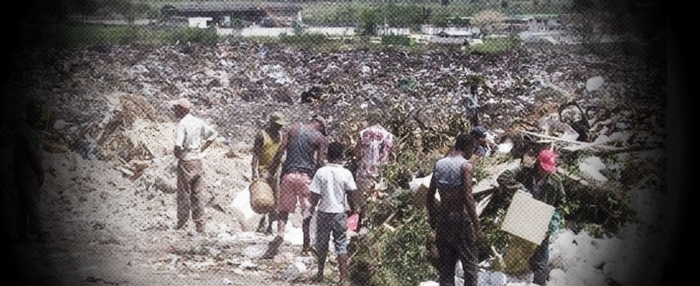
In socialist Cuba waste is recycled but not as an ecological practice but as a means of survival. In one of the largest landfills in the capital you can see the so-called 'divers' digging in the dumps to feed the black market circuits, where authorities and traffickers have a slice, until the products -mayonnaise or meat, grains or soft drinks- arrive at the domestic pantries. With this work, Armando.info begins to publish in-depth reports made in the largest of the Antilles.
|
Getting your Trinity Audio player ready...
|
Havana - Cristino Rojas does not go along the Buena Suerte street, hawking Delicia mayonnaise or Toki soft drinks. He got these products from his humble and risky job as a collector in a landfill in Havana. A lethal disease took him in less than six months. While in the rest of the world the big markets throw out tons of food close to their expiration date, in Fidel Castro's Cuba the Government and the black market only pretend to do it.
Distrust of buying groceries or toiletries increases in Havana. Wholesale products, which are often expired or close to expiration, escape from stores and warehouses, including clandestine copies or adulterations of those of greater consumption, like coffee, rum and an immeasurable range of products. There are less and less product lines complying with the regulatory cycle in shelves of stores or capital fairs. And as soon as they are dumped in the dunghills, they are recycled by the so-called divers or garbage diggers.
Everyone is reluctant to talk about dumping. This is what they call the unloading of each truck with discarded products from state companies that arrive at the landfill, the open-air garbage dump at Calle 100 y Ocho Vías, created in 1976 in the south of Havana. It is an area of ??about 200 square meters (2152 square feet) adjoining the municipalities of the capital outskirts of Arroyo Naranjo, Cotorro and San Miguel del Padrón, considered among the poorest and most polluted in the capital.
A regular visitor to the garbage dump, who remained anonymous - no photos or recording -, says that they expect a shipment of meat from the Cuban-Spanish company Tauros. In combination with the landfill custodians, they first proceed to do as if they will burn the product and bury it in previously opened pits, a ritual that takes place under the presence of the National Revolutionary Police (PNR). But the fire will be extinguished as soon as the authorities leave, and if the pits are covered with earth an excavator will be ready to dig up. Then the meat will be reloaded in private transport. It will be redistributed in established clandestine circuits of the informal market.
There, the first offer of recycled garbage expands in the population, in closer neighborhoods or districts, such as Ojo de Agua, Parcelación Moderna and San Francisco de Paula. Naturally, depending on what appears as an offer, it can be "marketed" in any part of the capital. Cheap prices are more attractive for a population with low resources.
In the last week of December 2015, a batch of beans returned to the streets of Havana, specifically to the town of La Lira, south of the capital. The merchandise was never incinerated in the landfill in Calle 100 y Ocho Vías.
"Many collectors made packages of red, black and white beans, as well as chickpeas. Nothing was incinerated or buried," argued Alexis Monterrey, one of the haulers who dump waste in Calle 100 y Ocho Vías.
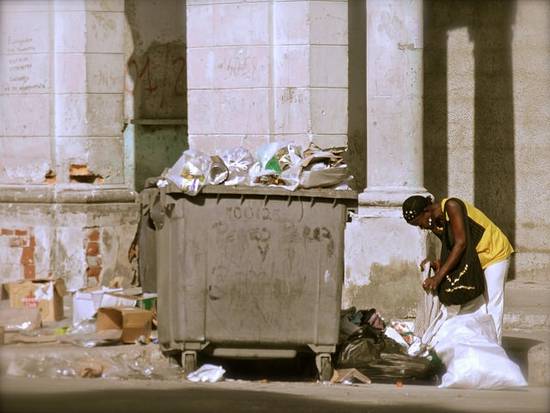
"The
dumping happens every week, more than once, and with any type of merchandise,
from parts and pieces of electronic equipment to personal care products. Here
everyone joins the game. Everyone receives their money: the truck driver, we the
loaders, and the custodians of the dump," says the anonymous witness.
The
landfill is arranged so that to throw and incinerate all kinds of remains,
without classification. The waste comes from companies, hospitals and the
residential sector. Attracted by this way of earning a living, countless divers
or waste collectors swarm and sometimes even live in the premises in makeshift
shanties. They have been evicted by the police, but they
return.
Poverty and ambition create new corruption pacts. They mixed the boundaries of the majority state property and the black market, confusing them. They include garbage and industrial waste, which make up real bottlenecks.
Garbage is already part of the city's environment. The growing stacks in the corners are raised with alarm by both official and independent newspapers. The accumulation occurs even by local regulation. The inhabitants of La Prosperidad, in the San Miguel del Padrón municipality, have to accumulate their own waste for over 20 days.
On January 1, 2016, the official newspaper Granma published in the section “Cartas a la Dirección” (Letters to the Directorate) the complaint of a citizen about a new spontaneous landfill. Since a year ago, garbage accumulates on Avenida 255, between 44 and 46, Punta Brava, La Lisa municipality, in the capital.
However, Armando Fernández, a sexagenarian of San José residential neighborhood in the Mayabeque municipality, puts the same thing into practice, but for convenience. As he trades in recycling, he fills all the rooms in his home with collected waste.
But the reality of the waste circuit is still much more complex. Sometimes expired products do not even arrive at the landfills.
At around five in the afternoon of last December 23, three employees of Comunales (a garbage collection state company) opened in the Pando Ferrer hospital the boxes and nylon bags that this institution disposes of to recycle bottles and medical instruments. This is corroborated by a video taken by Cuban journalist Laura Paz, a contributor to the Institute for War and Peace Reporting (IWPR).
Another case reported was the sale of mayonnaise and synthetic soft drinks with expired date labels in La Prosperidad neighborhood, San Miguel del Padrón municipality, in March 2012.
Subsequently, two other revelations of this endless detritus route were made, “Cacharreros” (junk dealers), by journalist and writer Frank Correa, on the digital portal Cubaprensalibre.com, in April 2014; or the release by journalist Miriam Herrera Calvo, “Granizado en vasos contaminados sacados de la basura” (Slush in contaminated glasses taken from the trash), en Cubanet.org, in January 2015.
The tittle-tattles of this shady trade border on the institutional, but nothing more. This is revealed by the open letter from the General Manager of Habana Oeste branch office of CIMEX stores (the commercial, retail and wholesale holding company of the Cuban State), in response to the article “¿Tienda Coyula o Tienda con coyunda?” (A Coyula store or a strapped store?), a report published in Cubadebate, a governmental digital portal. In this case, it is recognized that the commercial establishment was selling expired paint, and not even at a sale price, and despite the official regulation that provides the removal of every expired product from the shelves.
Surreptitious recycling emerges in the meager daily consumption, in the same way that causes of death, epidemics and contamination increase.
The first known death among the inhabitants-merchants of the garbage dump of Calle 100 and Ocho Vías was in 2001. Back then, Cristino Rojas, a man of only 36 years old became ill and died in a devastating manner, his family recalls. According to his death certificate, it was due to acute lymphoblastic leukemia.
The next sudden death occurred in 2014, in the garbage dump at Calle 100. Fredy González, 40, lived in the dump. Fearing the spread of a very aggressive infection, the Public Health authorities shrouded him right there, as some told to this team of landfill reporters.
Under anonymity, two physicians from the Institute of Oncology stated that acute lymphoblastic leukemia is an acquired cancer disease and that there is no effective treatment on the island to fight it.
"The ongoing exposure to lead, tin and radioactive products is a potential active component for this pathology," said one of them.
An agreement signed in 2007 by and between the Ministry of Science, Technology and the Environment in the Department of Community Services of the City of Havana and the Japanese Agency for International Cooperation and the International Pacific Consulting Company Nippon Koei Co. provided for a plan to be developed for rational waste management. It was a 9-year project with a budget of 96.7 million US dollars and 138.4 million Cuban pesos.
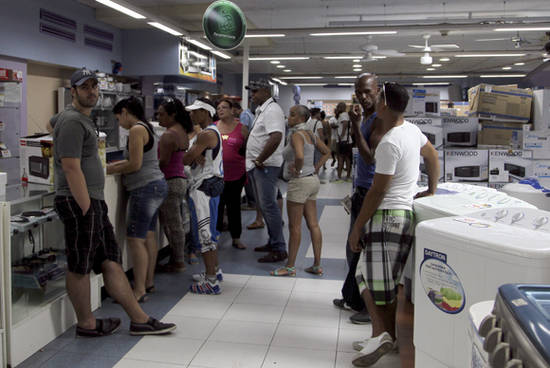
The main objective of this plan was to classify garbage from its own dumping base in suburban neighborhoods, with the possibility of extending it to the rest of the city. It also aimed to clean up the existing dumps, where for over 40 years, organic and inorganic waste is mixed in a noxious cocktail. The goal was to transform them into controlled waste disposal sites. Harmful emissions and earth contamination would be reduced to a sustainable minimum. They would be transformed into healthy recycling sites that would produce compost and biogas.
Once the deadline was reached in 2015, the goals to achieve were very far from the aim. On the contrary, the garbage dumps in the city and the clandestine trade with its contents significantly increased, thus the danger for the population.
Luis Martínez, a long-experienced environmental specialist and former professor at Universidad de La Habana, went into great detail about this matter in an interview. He assured that classifying garbage is indispensable. There are soils contaminated due to mercury waste. They can pollute underground water with carcinogenic compounds.
"The continuous and disorganized mixing of landfills caused heavy metals and other harmful products to settle in the land," he said.
Another consulted oncologist who requested to remain anonymous said, "There are risk factors that are linked to neoplastic diseases. People working with lead, asbestos, beryllium and other toxic substances are in a medium with risk factors. Neoplasms, like viral leukemia and fatal infections are likely to incubate in individuals who are permanently in a polluted environment like mixed garbage."
He also assured that cancer is the first cause of death in the country. The national statistics confirm it, as they are extreme if compared to the statistics of other nations in the area: one out of five deaths is a victim of cancer.
The specialist emphasized that the national figures —which have experienced a 3% increase in deaths from cancer from 2000 to 2014, as recorded in the Public Health Statistical Yearbook— could be even higher.
"The statistics are distorted because the cause of death indicated in death certificates often hides the main reason for death," he said.
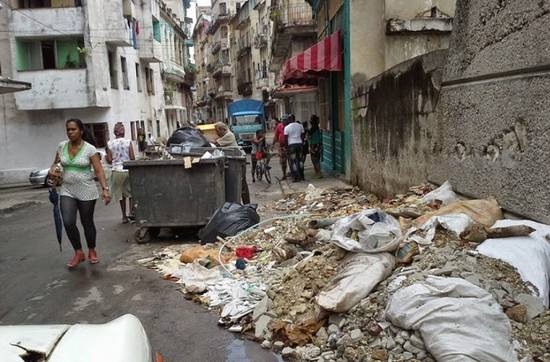
It is common that in places where mixed garbage accumulates for years, emanations like methane, trichloroethylene and benzene are produced. All cause diseases of various types, some fatal. The expert consulted warned that this type of contamination was not occurring in landfill garbage only.
"There are industrial plants in Cuba that are capable of concentrating metals in their proportion up to 15 times," he concluded.
"In addition, the oxidants that farmers are using to accelerate the ripening of earth fruits and their sale, like calcium carbide and other artisanal alcohols, contain heavy metals that are absolute producers of cancer, which are directly consumed by the population throughout the country, without any sanitary control ", commented specialist Martínez.
The careless contamination of land indicated by former professor Luís Martínez is confirmed by a study published in the Cuban Journal of Health and Work (2012/13 (1) / 3-9), of the Institute of Sciences, Technologies and Environment, “Evaluación de la incorporación de metales pesados al agro-ecosistema. Rol de las prácticas productivas ejecutadas por los trabajadores agrícolas” (Evaluation of the incorporation of heavy metals into the agro-ecosystem. Role of productive practices executed by agricultural workers).
In this extensive study it is stated that "...for several years, the area under study has been exposed to the effects of the emission of aerosols associated with spontaneous fires caused by the combustion of gases as a result of the fermentation of the organic waste of urban solids, bad odors, presence of rodents and insects and the proven contamination of the Almendares river waters that circulate in the area, resulting in alterations in the physical-chemical and microbiological parameters of the river waters.”
Trade and general corruption take the increasing jam and final disposal of garbage to a new-route recycling. They are trade agreements of spontaneous organization that operate surreptitiously within the same State apparatus, including the direct theft of their coffers. With the almost absolute state monopoly of the national official import and distribution, it is too tempting with the prevailing poverty. It becomes impossible for individuals of the state administration not to be part of this illicit trade and incur in crimes that - along with bureaucratic negligence -do not affect public health.
A broad report of December 11, 2014, by the official Granma newspaper “El rastro de la basura” (The Garbage Trail), by Arlin Alberty Loforte, which includes interviews with three officials related to public hygiene, does not mention the status of the restructuring plan of Havana landfills. The attempts to communicate by telephone with them and ask for their opinion on this issue were futile. The telephone numbers provided by the Information department of the State Telephone Company (ETECSA) did not correspond with those of the officials José Luis Toledo Álvarez, vice president of the Provincial Administration Board, Adalberto Freyre Giraudy, director of Comunales in Centro Habana municipality, and Abel Camejo Peñalbert, first vice president of the Administration Board of Havana.
Thirteen years after the death of Cristino and only two after Fredy's, other divers are immersed in a business of few that involves many. The garbage and the dark shortcuts of recycling contribute to the pantry of the Cubans.
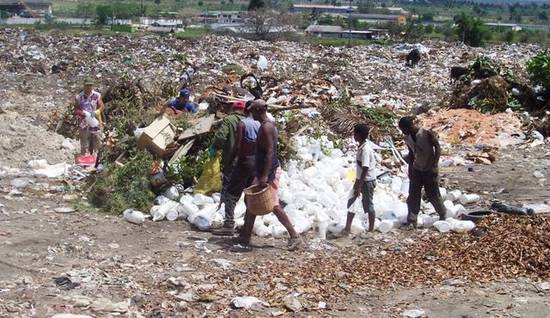
Armando.info publishes an excerpt from the extended edition of “Los brujos de Chávez” (Chávez’s warlocks and witches), the lauded book by David Placer, a Venezuelan journalist based in Spain, published in Venezuela by the publishing company Editorial Dahbar. The chronicle shows what could be the highlight of the Chavista Santeria, the exhumation of the remains of Simón Bolívar, ordered by the late president commander because he was determined to prove that the Liberator had been poisoned in San Pedro Alejandrino. From there, Placer cites episodes and talks with witnesses in Miami and Caracas, who claim that Chávez became a santero (practitioner of Santeria) before assuming the presidency for the first time in 1999. With his research, Placer completed a deliberately hidden aspect of the volcanic life of the leader of the Bolivarian process.
José Gregorio Vicari Méndez, an assimilated physician of the Bolivarian Army, was the successful owner of Proveeduría Médica VDS, a medical supplies company that signed hundreds of contracts with the health office during the oil boom. This finding is part of a database developed by Armando.info with the public information contained in the National Register of Contractors. Although the Organic Law of the Office of the Comptroller states that an active official could have administrative responsibility if entering into contracts with the State, Vicari Méndez, who is no longer a member of the company, presents an argument in his defend that goes beyond the tragedy of Venezuela's shortages. "If I have a patient with a requirement, if there is no material, but I know where there is, I look for it. What should I do? Should I not operate?
A contagious disease has reappeared in Venezuela. After 24 years of being considered eradicated, the inhabitants of the south of the country are experiencing a diphtheria outbreak of hitherto incalculable scales. Minister of Health Luisana Melo has recognized as official medical report only two deaths out of the four cases confirmed by her office until October 11. But several death certificates, collected in situ by Armando.info, indicate that the number of deaths is higher.
For three months, a reporter of Armando.info followed the lead of a seller exclusively engaged in diverting oncology medicines from state institutions to the black market, where they can be sold at 300 times higher prices. Her motivation was some basic questions: Are they angels or opportunists? How do they organize their networks? Still with unresolved doubts, she finds that it is a trade that has become possible only in the aftermath of the Bolivarian revolution in Venezuela, in the midst of chronic shortages and bureaucratic controls.
The indicators of the Orinoco Delta surpass the world average. Doctors believe these indigenous people are facing a much more aggressive strain that threatens the survival of an entire population. The authorities, meanwhile, have kept silence about this case. Here is the first installment of this investigative report.
There is a legend in the mountain chain Sierra de Perijá that blames its felling on a transnational company. A journalist traveled the route of taro (locally known as ocumo) and after a trip through western Venezuela, he found that - contrary to official complaints - the root of discord is served in Bolivarian government markets.
When Vice President Delcy Rodríguez turned to a group of Mexican friends and partners to lessen the new electricity emergency in Venezuela, she laid the foundation stone of a shortcut through which Chavismo and its commercial allies have dodged the sanctions imposed by Washington on PDVSA’s exports of crude oil. Since then, with Alex Saab, Joaquín Leal and Alessandro Bazzoni as key figures, the circuit has spread to some thirty countries to trade other Venezuelan commodities. This is part of the revelations of this joint investigative series between the newspaper El País and Armando.info, developed from a leak of thousands of documents.
Leaked documents on Libre Abordo and the rest of the shady network that Joaquín Leal managed from Mexico, with tentacles reaching 30 countries, ―aimed to trade PDVSA crude oil and other raw materials that the Caracas regime needed to place in international markets in spite of the sanctions― show that the businessman claimed to have the approval of the Mexican government and supplies from Segalmex, an official entity. Beyond this smoking gun, there is evidence that Leal had privileged access to the vice foreign minister for Latin America and the Caribbean, Maximiliano Reyes.
The business structure that Alex Saab had registered in Turkey—revealed in 2018 in an article by Armando.info—was merely a false start for his plans to export Venezuelan coal. Almost simultaneously, the Colombian merchant made contact with his Mexican counterpart, Joaquín Leal, to plot a network that would not only market crude oil from Venezuelan state oil company PDVSA, as part of a maneuver to bypass the sanctions imposed by Washington, but would also take charge of a scheme to export coal from the mines of Zulia, in western Venezuela. The dirty play allowed that thousands of tons, valued in millions of dollars, ended up in ports in Mexico and Central America.
As part of their business network based in Mexico, with one foot in Dubai, the two traders devised a way to replace the operation of the large international credit card franchises if they were to abandon the Venezuelan market because of Washington’s sanctions. The developed electronic payment system, “Paquete Alcance,” aimed to get hundreds of millions of dollars in remittances sent by expatriates and use them to finance purchases at CLAP stores.
Scions of different lineages of tycoons in Venezuela, Francisco D’Agostino and Eduardo Cisneros are non-blood relatives. They were also partners for a short time in Elemento Oil & Gas Ltd, a Malta-based company, over which the young Cisneros eventually took full ownership. Elemento was a protagonist in the secret network of Venezuelan crude oil marketing that Joaquín Leal activated from Mexico. However, when it came to imposing sanctions, Washington penalized D’Agostino only… Why?
Through a company registered in Mexico – Consorcio Panamericano de Exportación – with no known trajectory or experience, Joaquín Leal made a daring proposal to the Venezuelan Guyana Corporation to “reactivate” the aluminum industry, paralyzed after March 2019 blackout. The business proposed to pay the power supply of state-owned companies in exchange for payment-in-kind with the metal.